
The Vice President, Shri Jagdeep Dhankhar today said that India had a glorious heritage of not only ‘tolerance’ for others’ views, but a unique culture of ‘engagement’ with all views – a culture of pluralism and syncretism. He further said that this spirit of mutual respect was exemplified by Indian kings too – from the time of the great Asoka to the crown prince Dara Shikoh.
Addressing a gathering after releasing the Arabic Version of “Majma Ul-Bahrain” of Dara Shikoh in New Delhi today, the Vice President said that Majma-ul-Bahrain (which means ‘Confluence of Two Oceans’) throws invaluable light on the similarities between religions and helped bring stronger unity among the people of India. “It remains ever relevant to not only India but to the entire humanity,” he added.
Calling Dara Shikoh a genius, a skilled poet, and a Sanskrit scholar, the Vice President said that he was a torchbearer of social harmony and religious unity. In this book ‘Majma-ul-Bahrain’, Dara Shikoh listed one by one, all the commonalities between Hinduism (Vedanta) and Islam (Sufism) and came to the conclusion that the difference between Islam and Hinduism is only verbal.
Mentioning that Dara Shikoh strove for improving dialogue between different religions, Shri Dhankhar called for reviving his legacy and applying his spiritual thought to strengthen social cohesion in the present times.
The Vice President appreciated the translator of the book, Shri Amar Hasan, the publisher and ICCR for bringing out this book which opens up the celebrated work of the Mughal prince Dara Shikoh to Arabic-speaking audiences.
On this occasion, a song ‘Atulya Bharat Desh Mera’ commemorating Azadi ka Amrit Mahotsav was also released. The song written and produced by Shri Krishna Adhikari has been rendered by Shri Anand Karki, renowned Ghazal singer of Nepal.
Dr. Vinay Sahasrabuddhe, President, ICCR, Shri Bhubaneswar Kalita, Member of Parliament, Shri Kumar Tuhin, DG, ICCR, Shri Amar Hasan, Translator of the book, Persian scholar, Prof. Azarmi Dukhat Safavi, Shri Nabil Mroue, Publisher and other dignitaries attended the event.
Pictures of the event –
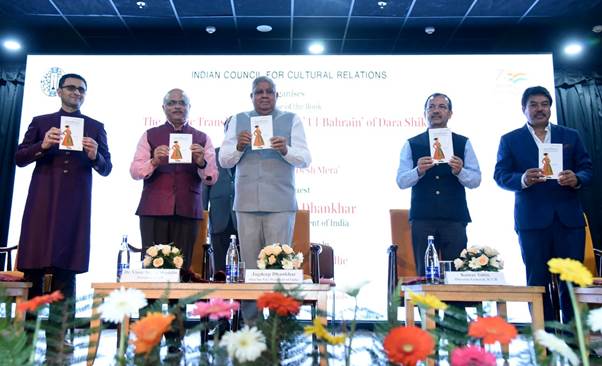
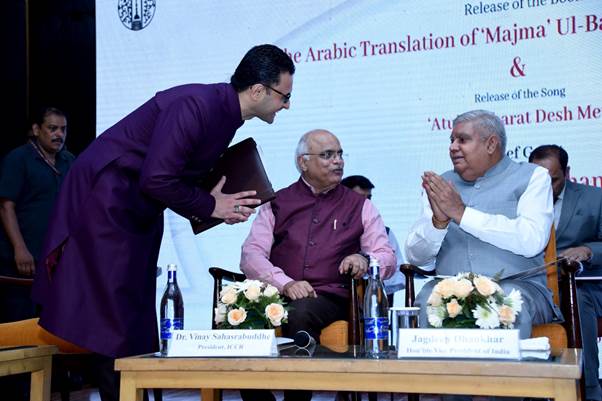
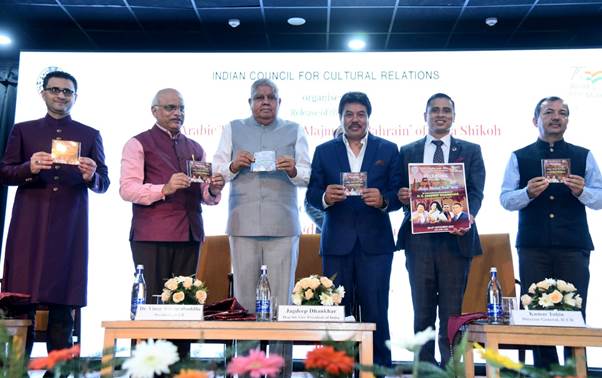
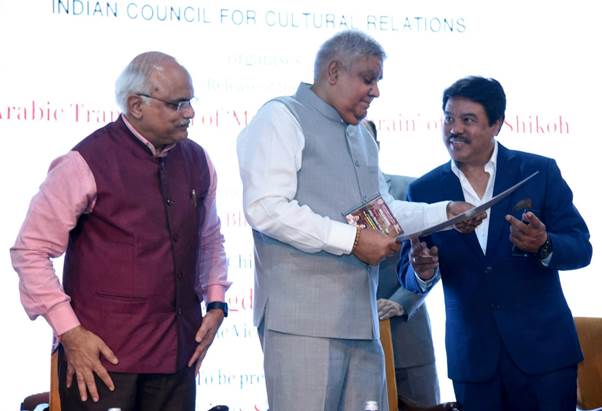
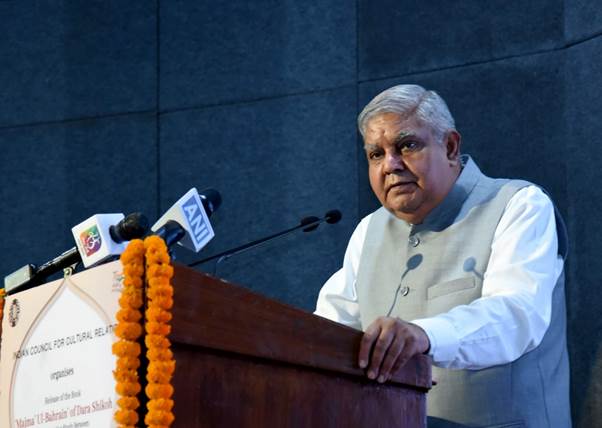
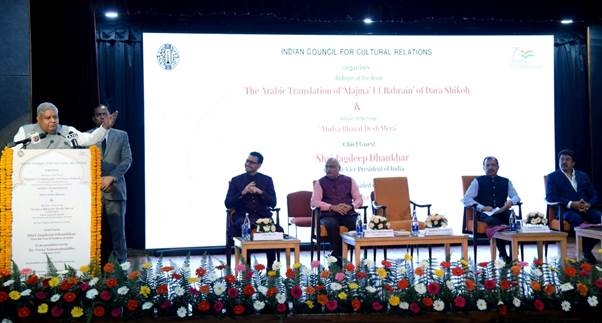
Following is the full text of speech –
Indeed, a pleasure to release the Arabic version of the book “Majma-ul-Bahrain” of Dara Shikoh, translated by Shri Amar Hasan amongst this august gathering today.
Grateful to ICCR for associating me with this program.
Best wishes and heartiest congratulations for excellent work to the translator, the publishers, ICCR and all others involved in bringing this book to a reality and opening up the celebrated work of the Mughal prince Dara Shikoh to Arabic-speaking audiences.
India had a glorious heritage of not only ‘tolerance’ for others’ views, but a unique culture of ‘engagement’ with all views – a culture of pluralism and syncretism.
It had been exemplified by Indian kings too – from the time of the great Asoka more than two millennia ago to the crown prince Dara Shikoh a few hundred years ago.
Dara Shikoh’s magnum opus Majma-ul-Bahrain (which means ‘Confluence of Two Oceans’) has helped in bringing stronger unity among the people of India. It remains ever relevant to not only India but to the entire humanity.
A genius, a skilled poet, and a Sanskrit scholar, Dara Shikoh studied Sufi and Vedic philosophies extensively.
He translated the Upanishads and other important works from Sanskrit to Persian. He was convinced that the Upanishads are what the Qur’an calls ‘Al-Kitab Al-Maknoun’ (The Hidden book).
Dara Shikoh was a torchbearer of social harmony.
We must revive his legacy and apply his spiritual thought to strengthen social cohesion in the present times.
Heartiest complement to Shri Amar Hasan for this magnanimous effort. The translation of Majma-ul-Bahrain into Arabic is a noble initiative that will bring our civilizations, which share ancient ties, even closer.
India has always believed in the philosophy of ‘Vasudhaiva Kutumbakam’. We truly believe the world is one family. ‘Sarva Dharma Samabhav’ is the soul of India.
The Indian thought and way of life has much to offer to the world, as shown in the work of Dara Shikoh.
We can reflect on the treasure of knowledge from this ancient land and herald a time of global peace for humanity.
Pleased to have released this important translation today. My warm regards to Dr. Vinay Sahasrabuddhe, President, ICCR for his untiring efforts. Best regards to one and all.
Thank you, Namaskar.
Jai Bharat.
*****
MS/RK/DP

